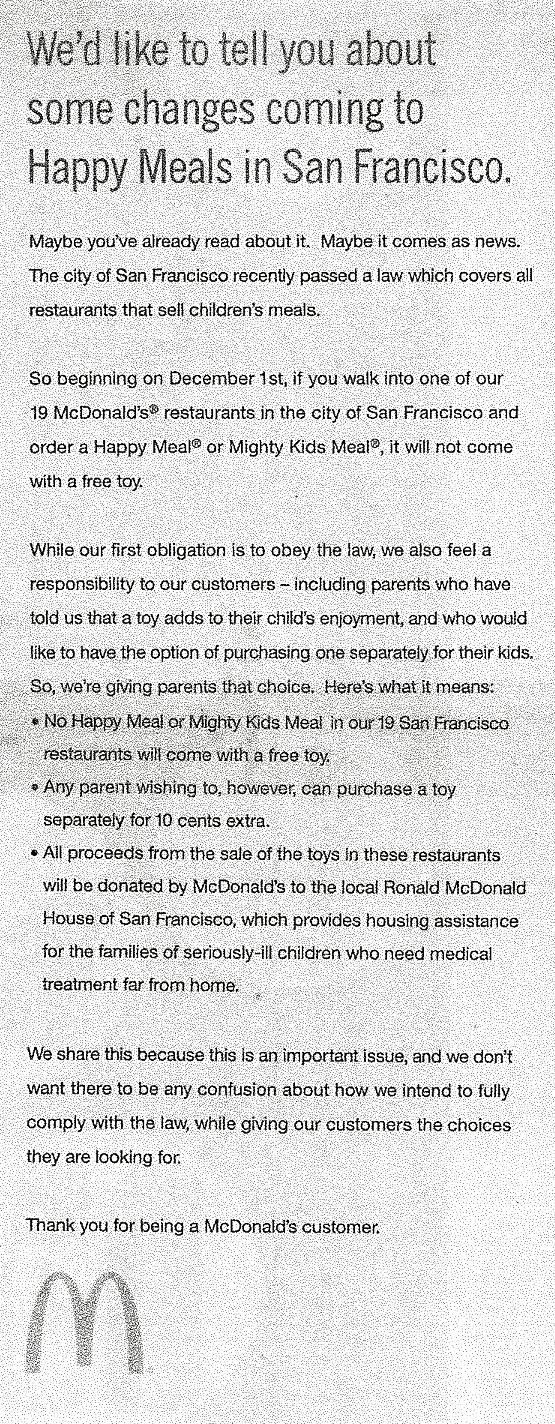While most media outlets dubbed it the “Happy Meal toy ban,” the ordinance passed in San Francisco last year didn’t ban anything. The law just placed a few reasonable nutrition guidelines (a maximum of 600 calories per meal and limits on fat and salt, for example) for restaurants using free toy incentives to lure kids into a lifetime of bad eating habits. In a rare victory for children’s health, the bill passed despite heavy lobbying by McDonald’s.
The law is scheduled to go into effect today, but the fast food giant — who didn’t want to change the nutritional makeup of its Happy Meals — has devised a clever gimmick to maintain the status quo. Instead of giving the toys away for free, parents will now pay 10 cents for the latest plastic action figure. And for bonus PR, the dime will be donated to the city’s Ronald McDonald House.
Some media outlets have claimed that McDonald’s has successfully found a loophole, or has dodged or skirted the law. And it may look that way on the surface, but I’m not so sure.
It’s not clear to this lawyer that the clown trick is in full compliance with the law. What has really changed and how exactly will this new 10-cent rule play out at the cash register? Is McDonald’s HQ requiring its San Francisco franchises to ask if a parent would like to pay 10 cents extra for the toy? Even if they are, the reality is that the Happy Meal business model depends on toys being automatically included.
Fast food outlets manipulate so-called “default options” on the menu to ensure maximum sales. For example, when you order a “combo meal” it’s likely to automatically come with a soda — not, say, juice or milk — because soda has higher profit margins.
McDonald’s is determined to keep Happy Meals tied to toys, because a new toy every week ensures repeat business (and repeated nagging). The easiest way to do this is to include the toy as the default option. If parents started refusing the toys, it would defeat the entire purpose of the Happy Meal: to fulfill the company’s (likely very lucrative) contractual agreements with media companies that require them to cross-promote the latest movie, kids’ TV show, etc.
It’s no wonder then, that McDonald’s is so desperate to retain the toys. But is this true compliance with a law that was meant to disassociate toys from unhealthy food? I don’t think so.
McDonald’s has a history of acting irresponsibly, despite its claims to the contrary. For example, the company proudly touts its membership in the Children’s Food and Beverage Initiative. Through this voluntary, self-regulatory trade group, the company makes numerous claims about how responsible its child marketing policy is, including:
McDonald’s is proud of our long heritage of responsible communication with our customers, especially children, and continues to play a leadership role in the development of standards that govern advertising for children and adults.
 McDonald’s ran this ad in the San Francisco Chronicle the day before the law took effect.However, an in-depth investigation by the Rudd Center on Food Policy and Obesity at Yale University found that McDonald’s has failed to live up to its voluntary pledge — in numerous ways. For example, the study found that McDonald’s increased its TV advertising from 2007 to 2009, with preschoolers seeing 21 percent more ads for McDonald’s and older children viewing 26 percent more.
McDonald’s ran this ad in the San Francisco Chronicle the day before the law took effect.However, an in-depth investigation by the Rudd Center on Food Policy and Obesity at Yale University found that McDonald’s has failed to live up to its voluntary pledge — in numerous ways. For example, the study found that McDonald’s increased its TV advertising from 2007 to 2009, with preschoolers seeing 21 percent more ads for McDonald’s and older children viewing 26 percent more.
The Rudd Center study also found:
- McDonald’s web-based marketing (on Ronald.com) is aimed at children as young as 2.
- McDonald’s 13 websites attracted 365,000 unique child visitors and 294,000 unique teen visitors on average each month in 2009.
- African American teens viewed 75 percent more TV ads for McDonald’s compared to white teens.
All this is despite McDonald’s “commitment to responsible marketing to children.”
The Rudd Center also found that this type of marketing works. Forty percent of parents reported their child asks to go to McDonald’s at least once a week, with 15 percent of preschoolers asking to go every day. Wonder why? Toys play a huge part in that incessant asking. The fact that McDonald’s is so determined to keep toys shows just how huge.
Can’t parents just say no? Of course they can, but both ideas can be true: Parents need to set limits and McDonald’s needs to stop marketing to children. As ample science tells us, marketing to young children is inherently deceptive because they do not have the cognitive capacity to understand that they are being targeted. Therefore, under both federal and state law, marketing to young children is already illegal. (Read my previous article for the full legal explanation.)
As I see it, voluntary pledges are a dismal failure. Only better laws enforced over time will change the behavior of companies like McDonald’s. And when advocates do get laws passed to protect kids, McDonald’s will keep trying to avoid them. But we don’t have to let them get away with it. Here’s how you can get involved:
- If you live in San Francisco, contact San Francisco Supervisor Eric Mar’s office (the author of the bill) and tell him not to allow the City to accept this move by McDonald’s. San Francisco may still be able to fix the law with new language or change how it is enforced.
- Contact the San Francisco city attorney’s office to tell them the same thing.
- If you live elsewhere in California, contact the state attorney general’s office, which has authority to enforce consumer deception laws. If you live outside of California, you can find your state attorney general listed here.
- File a complaint with the Federal Trade Commission, the agency responsible for regulating advertising at the federal level. Deceptive marketing is already illegal, and marketing to young children is inherently deceptive.
- File a complaint with the industry-sponsored Children’s Food and Beverage Advertising Initiative about McDonald’s irresponsible marketing practices.
- Just for fun, contact McDonald’s to tell them what you think.
- Finally, support nonprofits that are working to hold companies like McDonald’s accountable. The two I recommend are The Campaign for a Commercial-Free Childhood and Corporate Accountability International.
It’s clear this company won’t improve on its own. Maybe it’s time to Occupy McDonald’s?


